The winds of change are sweeping through the software industry, driven by a powerful force: generative AI. This transformative technology is no longer a futuristic vision but a tangible reality reshaping how we design, build, and experience software.
Unveiling the Opportunity Landscape
A recent study by McKinsey & Company paints a vivid picture of the immense potential that generative AI holds for various industries 1. Though challenging to decipher in the excerpt, the heatmap reveals a clear trend: high-tech, banking, energy, education, and telecommunications stand out as sectors primed for significant AI-driven disruption.
However, it’s the high-tech realm where the sparks truly fly. Generative AI is disrupting traditional software development models at their core, paving the way for intelligent and adaptable solutions. This shift goes beyond mere efficiency gains; it demands reimagining the skillsets needed to thrive in this evolving landscape.
Skills in flux
Traditionally, software development was dominated by the prowess of code-slinging champions. Today, the tide is turning. Data scientists and developers with expertise in machine learning frameworks like TensorFlow and PyTorch are taking center stage2. The race is on for companies to adapt, embrace this influx of specialized talent, and integrate it seamlessly into their teams.
The consolidation trend further underscores the urgency of this shift. Large players like Snowflake, Google, Adobe, and Databricks are swallowing up promising AI startups at an alarming rate.3 This rapid acquisition spree reflects the fierce competition to claim a stake in the burgeoning AI domain and integrate its capabilities into existing platforms.

Beyond Software: A Broader Canvas
While software development stands at the forefront of the AI revolution, its impact extends far beyond. In healthcare, generative AI is fueling the development of diagnostic tools, personalized medical assistance, and accelerated drug discovery .4 Patient monitoring and care applications powered by AI transform how we deliver and experience healthcare.
From Developers to Code Orchestrators
The disruptive models unleashed by generative AI are redefining the very essence of software development. Take automation, for instance. Imagine a world where AI tools like GitHub Copilot suggest code snippets and write entire functions! This paradigm shift transforms developers from code-writing machines into AI-orchestrating masters, overseeing and integrating the machine-generated code with their expertise.
Real-time Data, Personalized Experiences
Another game-changer is the ability to process user data in real time. Preferences and behaviors become the brushstrokes with which AI paints a personalized canvas. Think intelligent chatbots, virtual assistants, and location-aware apps, all tailored to individual needs and preferences. This hyper-personalization promises to revolutionize user experiences, making software functional, deeply intuitive, and responsive.
The Human-AI Symphony
The rise of generative AI doesn’t spell the demise of human developers. Instead, it ushers in a new era of collaboration, where human ingenuity and creativity intertwine with the power of AI. As Jeff Atwood, a renowned software developer, aptly put it, “The future of software development is less about writing code and more about understanding what code should do” 5
Ultimately, generative AI is not a replacement but a catalyst for human potential. It frees developers from the drudgery of repetitive tasks, allowing them to focus on the higher-order thinking, innovation, and problem-solving that truly drive progress. This human-AI symphony holds the key to unlocking the next chapter of software development, where automation and personalization dance hand-in-hand to create experiences that are not just intelligent but deeply human.
Takeaways
This article has explored the multifaceted impact of generative AI on software development, venturing beyond the snippet provided. However, the conversation doesn’t end here. Each bullet point can be delved into further, exploring specific examples, use cases, and potential challenges. The ethical considerations surrounding AI-generated code, the impact on job markets, and the need for continuous workforce reskilling are crucial aspects waiting to be discussed.
As we stand at the threshold of this transformative era, it’s crucial to acknowledge that the journey ahead will be filled with both opportunities and challenges. But by embracing the power of generative AI and fostering a spirit of collaboration between humans and machines
References
- McKinsey & Company, “Generative AI: The Technology Redefining Industries,” June, 2023 ↩︎
- Tech Crunch, “The Rise of the Data Scientist in Software Development,” April, 2021 ↩︎
- Forbes, “AI Acquisition Spree Heats Up as Big Techs Gobble Up Startups,” Oct, 2023 ↩︎
- MIT Technology Review, “AI Takes the Helm in Healthcare: Diagnosis, Treatment, and Beyond,” April, 2023 ↩︎
- Hunt & Thomas, “The Pragmatic Programmer: From Journeyman to Master,” 2nd Edition, 2019 ↩︎


